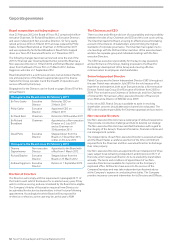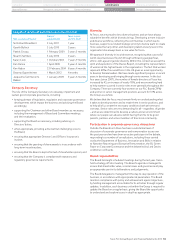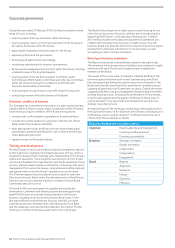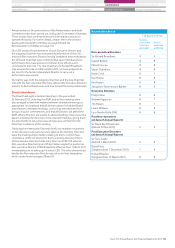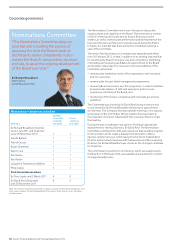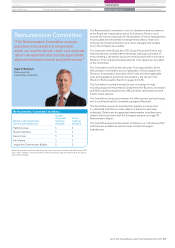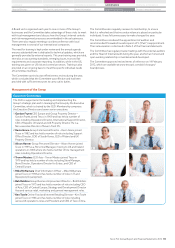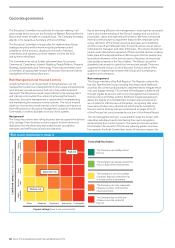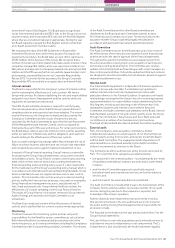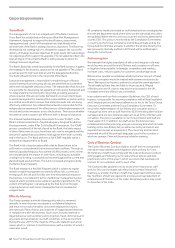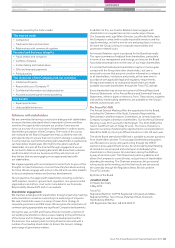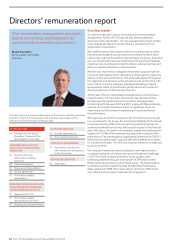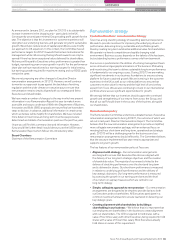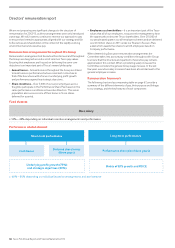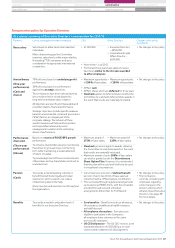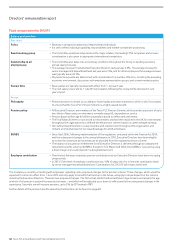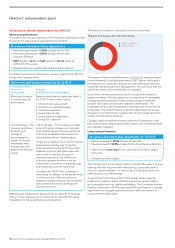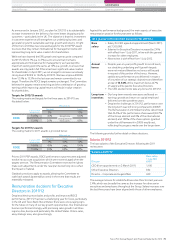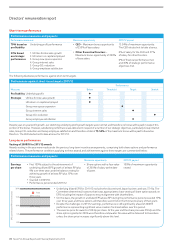Tesco 2012 Annual Report Download - page 66
Download and view the complete annual report
Please find page 66 of the 2012 Tesco annual report below. You can navigate through the pages in the report by either clicking on the pages listed below, or by using the keyword search tool below to find specific information within the annual report.
Tesco Bank
The management of risk is an integral part of the Bank’s business.
Tesco Bank has established an Enterprise Wide Risk Management
Framework, designed to support the identification, assessment,
management and control of the material risks that threaten the
achievement of the Bank’s strategic business objectives. The Bank has
developed a risk strategy which is designed to support the successful
delivery of strategic business objectives through clearly defined strategic
risk objectives which support risk appetite. The risk appetite reflects the
level and type of risks that the Bank is willing to take to deliver its
strategic business objectives.
The Bank’s Board has overall responsibility for the Bank business. It agrees
the strategy for the business, approves the risk appetite of Tesco Bank
as well as specific high level policies and the delegated authorities.
The Bank’s Board monitor’s the risk profile of the Bank.
Executive management is responsible for establishing an effective
control framework and ensuring all risks are identified and controlled
within the risk appetite and policy limits. The independent Risk function
is responsible for developing risk appetite and the policy framework and
for independently monitoring the risk profile, providing assurance
where required. Risk also provides frameworks, tools and techniques
to assist management in meeting their responsibilities, as well as acting
as a central coordinator to ensure that enterprise wide risks are being
effectively addressed. Tesco Bank Internal Audit is responsible for the
independent assessment of the effectiveness of the implementation of
the risk and control measures across the business. They assess whether
the internal control systems are effective both in design and practice.
The Internal Capital Adequacy Assessment Process (‘ICAAP’) is the
Bank’s internal assessment of capital adequacy designed to address
the requirements under Pillar 2 of the Basel II framework. The ICAAP
process considers all of the risks faced by the Bank, the likely impact
of them if they were to occur, how these risks can be mitigated and the
amount of capital that is prudent to hold against them both currently
and in the future. The Bank performs a full ICAAP regularly which is
reviewed and approved by its Board.
The Bank holds a liquid asset portfolio that its Board deem to be
sufficient to cover potential future stressed cash outflows. Through its
Internal Liquidity Adequacy Assessment (‘ILAA’) process, stress events
are simulated and the impact on cash flows, including any available
contingency funding, is assessed and reviewed against the current and
planned liquid asset portfolio. The ILAA is reviewed and approved by
the Bank’s Board regularly.
The Bank maintains a Key Risk Register, which is subject to regular
review to enable management to identify all key risks, current and
emerging. As the risk profile shifts over time the potential impact on
the business is considered in terms of additional management action
required and/or possible extra capital or liquidity requirements. The
content of the Register is developed by the Risk function through
ongoing discussion with senior management and is reviewed on
a regular basis.
Whistle-blowing
The Group operates a whistle-blowing policy which is reviewed
annually. In every business we operate a confidential telephone
and email service which enables concerned employees to report,
anonymously if they choose, any instances of inappropriate behaviour
or malpractice within the business. Such issues include unethical or
illegal behaviour such as bribery and corruption, fraud, dishonesty and
any practices that endanger our staff, customers or the environment.
During the year 2011/12 the majority of the calls related to personnel
issues, which is common in most businesses, with a number of security
issues also raised.
All complaints made are treated as confidential and are investigated by
the relevant department and where we know the individual, the callers
are updated. Where there is a serious issue, this will be escalated to the
country CEO. This policy is monitored by the Compliance Committees
in country, by the Group Compliance Committee annually and by the
Group Audit Committee annually. In addition the whistle-blowing line
was previously internally audited in 2010 and will be audited again
during the current year.
Anti-corruption
We maintain the highest standards of ethics and integrity in the way
we do business around the world. Bribery and corruption in all forms
is illegal and unacceptable. It damages competition and markets,
increases costs, reduces quality for customers and damages trust.
Wherever we operate we will always abide by the law. Any act of fraud,
bribery or corruption would be treated with extreme seriousness by
Tesco. We expect our business partners to adopt the same approach.
Those breaking these laws are liable to be prosecuted. Alleged
offenders who are UK citizens may also be prosecuted in the UK,
no matter where the offence was committed.
In accordance with our Anti-corruption Guidelines, the CEO of each
business is responsible for ensuring compliance with all local legislation
and Company policies and report adherence to this to the Tesco Group
Executive Committee and the Group Compliance Committee. To
ensure the implementation of our bribery and corruption policy, a
message has been sent to staff from their CEO reminding them of both
our Values and our zero tolerance approach to all forms of bribery and
corruption. The policy is available on our Group Intranet and staff are
made aware of it. In addition, key staff across the business have
completed anti-bribery training, using an e-learning tool which includes
training on the new Bribery Act, as well as our policy, and which also
requires them to pass an assessment. The e-learning tool has been
translated into all of the principal languages used in the countries in
which we operate. There will be annual refresher training.
Code of Business Conduct
The Code of Business Conduct explains to staff their most important
individual responsibilities and obligations while working for Tesco.
All members of staff must comply with the Code of Business Conduct.
Acting legally and following our Group and local policies and best
practice are some of the ways in which we ensure that we always do
our best for our customers and for each other.
The Code provides guidance on key issues which may arise as staff
work for Tesco and indicates who they should contact if they think
that they, or another member of staff, may have breached those rules.
Key members of staff are required to provide an annual statement of
compliance with the terms of the Code. Disciplinary action may result
for breaches of the Code.
Corporate governance
62 Tesco PLC Annual Report and Financial Statements 2012


